I've had an amorphous blob.
I mean, an epiphany.
I don't know how to write.
Hold on! Come back, there's more.
See, it all started with the author blog chain going on today. I'll link to Tawna Fenske because she started it, and has links to the other five participating authors in there.
The point of these posts was for these six authors to explain their writing processes. Which is, I'll admit, like crack to me. I love following/stalking/ admiring authors from a distance. Not only is it really wonderful to get to know them, I love seeing the process through their eyes, and I love being happy for them as things happen. I'll also admit to loving letting my imagination go wild with the someday-when-that-happens-to-mes.
But today, reading each and every one of their blogs, and seeing how all of their writing processes were so alike and yet so different from mine got me thinking that I don't know how to write. If I were to write a post detailing my writing process, well, frankly, it would resemble each of theirs in turn to some degree. But there's no one way I can pin down and say, hey, this is how I write.
Sometimes, I become full-bore obsessed with a project and churn it out like a stomach flu I can't seem to shake. (Lovely image, I know. Sorry).
Other times, I let the idea simmer as the plot and characters run around in my head and get to know each other.
Yet other times I plan everything out (albeit in my head) and write from an outline I carry with me everywhere I go.
And sometimes I do all of the above in alternating phases.
What's the point? I think my point isn't new, but it certainly struck me upside the head today: there is no one "real" way to go about writing. No one place to turn to and have the same results as, say, The King (by which I mean Stephen). If that were the case; if it were really that easy, we'd all be writing the same story.
And maybe we are all writing the same story, on some lower level. But we are each doing it in our own ways and with our own approaches to life, and therefore, even if you did write like Stephen King, you would probably never write what Stephen King has written. (Assuming a vacuum/ bubble and laboratory control, for all you science-y types).
So I guess my point is that while I still fully intend to stalk/follow/admire writers, and I still intend to love doing so, I'm going to stop seeking out my method of writing as a reason why I haven't been agented/published yet. Just because I don't outline, or do, or get it out all in a month, or take a year to write something, doesn't mean it's not worth the effort. I'll continue to take what I can from author posts and work hard to improve my own writing in the ways that matter. Someday maybe I'll have a set method (for example: when I'm under deadline), but for right now I'm fine writing my way. I'll re-evaluate when it's time-- whether I need a more disciplined method due to a deadline, or just a different method because nothing's happening for me.
Do you have a set method, or does your writing morph as you need it to?
A former zoo educator and animal keeper shares the day-to-day and challenges of life with animals, as well as the adventures of writing.
Pages
▼
Friday, April 30, 2010
Thursday, April 29, 2010
The Sarcasm Font, or, my attempt at feeling better about the world at large
I'm hoping to shear two sheep with one hand here. (Yes, I'm aware that's not really the metaphor typically used. I'm also aware it doesn't make sense. But I don't advocate killing animals when I can help it, so go with the mad hatter version, kay?)
U kNo ThE pEePuL oN TeH iNtErNeT wHo WrAiTe LeIk ThIs?
Well, that's one problem.
And then there's the problem of sarcasm on the internet. See, sarcasm is a silent social killer-- undetectable to the naked stranger's eye (whoa naked stranger!), it can kill a conversation faster than bringing up Charles Manson. Unless you're already talking about Charles Manson.
See, the thing about people is that a lot of us (especially 'round these parts) connect to people that we don't already know by using humor. And sarcasm, though some call it the lowest form of humor. . . chumps. . . is one of the ways that people escape the social awkwardness of a new meeting and connect with the person they're talking to. But it's a risk, especially in type, because it can look totally serious when you tell them that Charles Manson is your hero. For reals. If the person doesn't understand or know that you tend to be a sarcastic person, they may turn and run. Screaming.
What's an internet-savvy person to do? Well, I suppose the easiest way is just to not use sarcasm with someone you just met. But who wants to do that?
Therefore, and heretowith, I propose a sarcasm font. I propose that when writing in sarcastics, one should aLtErNaTeLy CaPiTaLiZe every other letter of each word. Ideally, this will catch on and HTML text editors and word processing programs will have an sS next to the i, b, and u they already have for the other font effects, so you don't have to actually type like that. Hopefully within six months to a year, depending on the power of the movement.
The other benefit, which is also an assessed risk, is that everyone else who already types on the internet like this will eventually be automatically assumed to be sarcastic. Thus rescuing my faith in humanity because SERIOUSLY WHO DOES THAT ALL THE TIME AND WHY WOULD YOU IT TOOK ME LIKE TEN TIMES LONGER THAN NORMAL TO TYPE THE PARTS WHERE I DID THAT IN THIS POST NO WONDER YOUR SPELLING AND GRAMMAR ARE SO ATROCIOUS.
Okay. I feel better now.
U kNo ThE pEePuL oN TeH iNtErNeT wHo WrAiTe LeIk ThIs?
Well, that's one problem.
And then there's the problem of sarcasm on the internet. See, sarcasm is a silent social killer-- undetectable to the naked stranger's eye (whoa naked stranger!), it can kill a conversation faster than bringing up Charles Manson. Unless you're already talking about Charles Manson.
See, the thing about people is that a lot of us (especially 'round these parts) connect to people that we don't already know by using humor. And sarcasm, though some call it the lowest form of humor. . . chumps. . . is one of the ways that people escape the social awkwardness of a new meeting and connect with the person they're talking to. But it's a risk, especially in type, because it can look totally serious when you tell them that Charles Manson is your hero. For reals. If the person doesn't understand or know that you tend to be a sarcastic person, they may turn and run. Screaming.
What's an internet-savvy person to do? Well, I suppose the easiest way is just to not use sarcasm with someone you just met. But who wants to do that?
Therefore, and heretowith, I propose a sarcasm font. I propose that when writing in sarcastics, one should aLtErNaTeLy CaPiTaLiZe every other letter of each word. Ideally, this will catch on and HTML text editors and word processing programs will have an sS next to the i, b, and u they already have for the other font effects, so you don't have to actually type like that. Hopefully within six months to a year, depending on the power of the movement.
The other benefit, which is also an assessed risk, is that everyone else who already types on the internet like this will eventually be automatically assumed to be sarcastic. Thus rescuing my faith in humanity because SERIOUSLY WHO DOES THAT ALL THE TIME AND WHY WOULD YOU IT TOOK ME LIKE TEN TIMES LONGER THAN NORMAL TO TYPE THE PARTS WHERE I DID THAT IN THIS POST NO WONDER YOUR SPELLING AND GRAMMAR ARE SO ATROCIOUS.
Okay. I feel better now.
Monday, April 26, 2010
Animals as MCs
Come check me out today at the Archives, too.
Shannon O'Donnell asked in the comments of my post about my specialty for ideas for a picture book animal MC that hasn't been overdone.
This is a great question. To be fair, I'm not 100% up-to-date on picture books, but I can throw out some unusual ones, and hopefully they haven't been done yet. Story is, of course, up to you! (Note: I tend to lean towards predators, only because I think they're AWESOME, but I'm not sure how this would go over for kid's books. Wouldn't want Jr. to walk up to a bear and go, "Oh! It's Bubba the Bear!" and get eaten. That would be bad. However, I'm assuming you know all about it, and I'll try to include some animals that wouldn't, you know, eat your readers if they met in an empty field).
-Shark
-Jellyfish
-Snake
-Gazelle
-Giraffe
-Puffin
-Manticore (kidding! Just seeing if you're paying attention)
-Zebra
-Tapir
-Snow Leopard
-Rhinoceros
-Wallaby
-Gorilla or other monkey/ primate
-Tyrannosaurus Rex (no Velociraptors, though)
Any good ideas in there? I hope so. Let me know if not, I can rattle off a few more.
Shannon O'Donnell asked in the comments of my post about my specialty for ideas for a picture book animal MC that hasn't been overdone.
This is a great question. To be fair, I'm not 100% up-to-date on picture books, but I can throw out some unusual ones, and hopefully they haven't been done yet. Story is, of course, up to you! (Note: I tend to lean towards predators, only because I think they're AWESOME, but I'm not sure how this would go over for kid's books. Wouldn't want Jr. to walk up to a bear and go, "Oh! It's Bubba the Bear!" and get eaten. That would be bad. However, I'm assuming you know all about it, and I'll try to include some animals that wouldn't, you know, eat your readers if they met in an empty field).
-Shark
-Jellyfish
-Snake
-Gazelle
-Giraffe
-Puffin
-Manticore (kidding! Just seeing if you're paying attention)
-Zebra
-Tapir
-Snow Leopard
-Rhinoceros
-Wallaby
-Gorilla or other monkey/ primate
-Tyrannosaurus Rex (no Velociraptors, though)
Any good ideas in there? I hope so. Let me know if not, I can rattle off a few more.
Thursday, April 22, 2010
Interstitial Horses
Thank you to everyone for your kind words on my post on Tuesday.
I know I said I'd go in order of the comments/ questions for my animal posts, but I thought I'd take a break every now and then and post about horses, because I have SO MUCH information on them.
Horses are kind of my bread and butter. I love them; have ever since my dad promised my sister and me that we would get one when I was eight. We even met the horse and named him (Zeus), but alas, we moved into the city shortly thereafter, and Zeus found another home.
I therefore begged my parents at every opportunity (birthdays, Christmas, Easter, Halloween, Arbor Day, Columbus Day, and occasional fourth of Julys) to get me a horse. Finally, in the seventh grade, my mom caved and got me riding lessons. I suppose she was hoping I would figure out I didn't really like them, or get it out of my system and leave them alone.
Nope. Also, no ponies under the Christmas tree. Finally, after several summers of working my way into riding lessons at various ranches around the county, I found a place to stay the summer after my senior year, and that's where I met my first (and eventual second) horse. I bought both of them with my own money, albeit five years apart, and continued to pay for them on my own.
Having my own horse(s) has taught me more about horses than anything else I've done. And I now fact-check horses EVERYWHERE. In movies, and in books, and anywhere else they might show up. It's a habit. And when I find mistakes, I tend to correct them, as any of my crit partners can tell you. So I thought I'd start with a Writer's Beginning Guide to Horses today, and get some basic terms and concepts out of the way.
(All of the following pictures come from statelinetack.com).
We'll start with accoutrements, commonly called tack. This includes just about anything a horse would wear for riding/ being ridden. I'll start with this because I find that tack is the thing most often messed up in fiction related to horses. That and gaits, but we'll get to those another time.
Halter: A halter is usually leather, rope, or nylon webbing with metal rings. It fits around the horse's face and throat, applying pressure on the nose and behind the ears (the poll). A halter is used to lead a horse.
I apologize this picture is so absolutely tiny. You get the gist, though, right?
Anyway, halters are most often confused with the bridle. The bridle is what's typically used for riding a horse, is made of leather, and has a bit, which is a metal piece that goes into the horse's mouth. The bit is used to control the direction and speed of the horse, though not exclusively. (As with anything about animals, there's a lot else I could go into here. We'll assume any riders in your books are going to be doing things the traditional way, and if you ever have any questions about advanced techniques or the what-ifs, feel free to email me). The bit is attached to reins, usually also leather, but can be nylon or rope, which the rider holds in their hands and pulls on in one direction or another to get the horse to turn, or both together to get the horse to slow down or stop.
This is a western bridle:
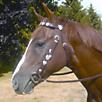
I know I said I'd go in order of the comments/ questions for my animal posts, but I thought I'd take a break every now and then and post about horses, because I have SO MUCH information on them.
Horses are kind of my bread and butter. I love them; have ever since my dad promised my sister and me that we would get one when I was eight. We even met the horse and named him (Zeus), but alas, we moved into the city shortly thereafter, and Zeus found another home.
I therefore begged my parents at every opportunity (birthdays, Christmas, Easter, Halloween, Arbor Day, Columbus Day, and occasional fourth of Julys) to get me a horse. Finally, in the seventh grade, my mom caved and got me riding lessons. I suppose she was hoping I would figure out I didn't really like them, or get it out of my system and leave them alone.
Nope. Also, no ponies under the Christmas tree. Finally, after several summers of working my way into riding lessons at various ranches around the county, I found a place to stay the summer after my senior year, and that's where I met my first (and eventual second) horse. I bought both of them with my own money, albeit five years apart, and continued to pay for them on my own.
Having my own horse(s) has taught me more about horses than anything else I've done. And I now fact-check horses EVERYWHERE. In movies, and in books, and anywhere else they might show up. It's a habit. And when I find mistakes, I tend to correct them, as any of my crit partners can tell you. So I thought I'd start with a Writer's Beginning Guide to Horses today, and get some basic terms and concepts out of the way.
(All of the following pictures come from statelinetack.com).
We'll start with accoutrements, commonly called tack. This includes just about anything a horse would wear for riding/ being ridden. I'll start with this because I find that tack is the thing most often messed up in fiction related to horses. That and gaits, but we'll get to those another time.
Halter: A halter is usually leather, rope, or nylon webbing with metal rings. It fits around the horse's face and throat, applying pressure on the nose and behind the ears (the poll). A halter is used to lead a horse.
I apologize this picture is so absolutely tiny. You get the gist, though, right?
Anyway, halters are most often confused with the bridle. The bridle is what's typically used for riding a horse, is made of leather, and has a bit, which is a metal piece that goes into the horse's mouth. The bit is used to control the direction and speed of the horse, though not exclusively. (As with anything about animals, there's a lot else I could go into here. We'll assume any riders in your books are going to be doing things the traditional way, and if you ever have any questions about advanced techniques or the what-ifs, feel free to email me). The bit is attached to reins, usually also leather, but can be nylon or rope, which the rider holds in their hands and pulls on in one direction or another to get the horse to turn, or both together to get the horse to slow down or stop.
This is a western bridle:

Source
Make sure your tack matches. If you're writing a cowboy or wild west novel set in the States, or a ranch novel, well, you probably know enough about horses that you don't need to read this. But, those novels would likely use Western tack. If you're setting it in England or Europe, or the East coast of the States, you'll likely need English tack.
Western and English bridles are very similar, they mostly make different uses of pressure (an English bridle often has a band that wraps around the nose, like a halter, whereas a Western bridle can have a curb strap that passes under the chin) and different bits. I won't go into bits today. Again, if you really need to know, email me.
Saddles: There are three primary types of saddles in use today. There's the Western, which is commonly used for long trail rides and working cattle. It's more of a "comfort" saddle, and has built-in features to help keep the rider on the horse:
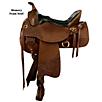
Western and English bridles are very similar, they mostly make different uses of pressure (an English bridle often has a band that wraps around the nose, like a halter, whereas a Western bridle can have a curb strap that passes under the chin) and different bits. I won't go into bits today. Again, if you really need to know, email me.
Saddles: There are three primary types of saddles in use today. There's the Western, which is commonly used for long trail rides and working cattle. It's more of a "comfort" saddle, and has built-in features to help keep the rider on the horse:

Source
English saddles are used for English riding, which most famously includes the "high disciplines" like dressage (horse dancing, if you will-- means training in French), and jumping. They put you closer to the horse and allow them to feel your movements more effectively, but it can require more balance on the part of the rider, at least on a beginning level:


Source
And the Australian stock saddle, which is sort of a combination of the two. It allows for the same close contact with the horse as the English saddle while giving the comfort and stability of the Western saddle:

Source

Source
Australian stock saddles have only become popular in the United States in the last 10-15 years or so, at least to my knowledge. But it's a design that's likely very similar to some historical saddles, which are a whole other ballgame.
So that's pretty much it for my most basic of basics beginning guide to tack. Any questions?
So that's pretty much it for my most basic of basics beginning guide to tack. Any questions?
Tuesday, April 20, 2010
Remembering something I'd long ago forgotten
Janet Reid's blog today reminded me of something that I've forgotten about myself.
Well, forgotten isn't a fair word. I guess I should say that I've moved on. It's no longer something that I think about often, if at all. Every now and then a loud, sudden noise will startle me, and I'll think back to it. But I'm still here, which is a lot more than some kids got.
Today is the eleventh anniversary of the Columbine shooting. On March 22, 2001, there was also a shooting at my high school, Granite Hills.
Luckily, no one died. There had been a shooting at another school (Santana High) in our same district only two weeks prior, and as a result, we had an on-campus officer (hero) named Rich Agundez. He stopped our shooter before anyone was seriously hurt.
But the fear-- the fear of dying, the fear of not knowing what was happening, the fear of wondering if anyone you knew was dead while huddled in a small chem supply room with 100 other students-- the fear stays, and takes time to fade.
The what-ifs can consume you, too, if you let them. What if the shooter had gotten there ten or fifteen minutes earlier, like he intended, when the whole school was still at lunch? What if the shooting at Santana hadn't just happened, and there was no on-campus officer?
Obviously these are questions I can't answer, and I won't try. For something so horribly wrong, things just went right that day. Right on the path of living, right on the path of luck.
At first, there was doubt. It sounded like someone dropping one of the many voluminous metal trash cans lining the concrete hallway outside. But there was a quality to the sound that made everyone in my chemistry class freeze. We'd all just sat down and written our names on a test, and I was deep in thought about question number two when I heard the first bang. I felt my heart slide down my spine, but I was a panicky kid, and didn't think much of it. Then it happened again, and someone asked if it was a gun shot.
By this time we were all watching our teacher, except the kids in the back row, who were watching out the windows. Someone said they saw people running.
Our teacher sprang up and ordered us to move into the supply room that annexed four classrooms in the building. The other classes came pouring in, and finally the teachers closed and locked the doors and turned off the lights. We sat in the dark, and waited.
I had no idea what was going on. No one did. Some kids were talking about opening the doors to the hallway outside and seeing if they could see anything. The rest of us quickly vetoed them.
It felt like years passed in that tiny, cramped room. Some kids were crying, including me.
At long last, something happened. I can't remember if someone went out and checked, or if they came in and got us, but the SWAT team was there. We all filed out of the room one by one, hands in the air. Uniformed masks with high-powered rifles aimed at us lined the halls as we walked out and across the street to a neighboring park, to wait for our parents to come get us. No one knew what happened.
A lot of kids whipped out their cell phones and called their parents. My mom was already on her way. The rest of the afternoon passed in a flash, and all I remember after is my mom running across the street to wrap me in her arms when she finally found me.
So, my experience with a school shooting ended better than most. There were some rather minor injuries (not mine) and a lot of trauma, but no lost friends. No place I couldn't come back from.
I know it's not March 22nd. It is, in fact, Columbine's day of remembrance. But on this day, I remembered something I'd forgotten-- what it was like. And remembering what it was like made me want to tell everyone who was at Columbine, and any other schools where terrible things have happened like this, that I understand. I understand, but I can never know. I can only imagine what it would have been like if things hadn't gone right that day.
And to Rich Agundez, wherever you are, thank you, again. Thank you a thousand times.
Well, forgotten isn't a fair word. I guess I should say that I've moved on. It's no longer something that I think about often, if at all. Every now and then a loud, sudden noise will startle me, and I'll think back to it. But I'm still here, which is a lot more than some kids got.
Today is the eleventh anniversary of the Columbine shooting. On March 22, 2001, there was also a shooting at my high school, Granite Hills.
Luckily, no one died. There had been a shooting at another school (Santana High) in our same district only two weeks prior, and as a result, we had an on-campus officer (hero) named Rich Agundez. He stopped our shooter before anyone was seriously hurt.
But the fear-- the fear of dying, the fear of not knowing what was happening, the fear of wondering if anyone you knew was dead while huddled in a small chem supply room with 100 other students-- the fear stays, and takes time to fade.
The what-ifs can consume you, too, if you let them. What if the shooter had gotten there ten or fifteen minutes earlier, like he intended, when the whole school was still at lunch? What if the shooting at Santana hadn't just happened, and there was no on-campus officer?
Obviously these are questions I can't answer, and I won't try. For something so horribly wrong, things just went right that day. Right on the path of living, right on the path of luck.
At first, there was doubt. It sounded like someone dropping one of the many voluminous metal trash cans lining the concrete hallway outside. But there was a quality to the sound that made everyone in my chemistry class freeze. We'd all just sat down and written our names on a test, and I was deep in thought about question number two when I heard the first bang. I felt my heart slide down my spine, but I was a panicky kid, and didn't think much of it. Then it happened again, and someone asked if it was a gun shot.
By this time we were all watching our teacher, except the kids in the back row, who were watching out the windows. Someone said they saw people running.
Our teacher sprang up and ordered us to move into the supply room that annexed four classrooms in the building. The other classes came pouring in, and finally the teachers closed and locked the doors and turned off the lights. We sat in the dark, and waited.
I had no idea what was going on. No one did. Some kids were talking about opening the doors to the hallway outside and seeing if they could see anything. The rest of us quickly vetoed them.
It felt like years passed in that tiny, cramped room. Some kids were crying, including me.
At long last, something happened. I can't remember if someone went out and checked, or if they came in and got us, but the SWAT team was there. We all filed out of the room one by one, hands in the air. Uniformed masks with high-powered rifles aimed at us lined the halls as we walked out and across the street to a neighboring park, to wait for our parents to come get us. No one knew what happened.
A lot of kids whipped out their cell phones and called their parents. My mom was already on her way. The rest of the afternoon passed in a flash, and all I remember after is my mom running across the street to wrap me in her arms when she finally found me.
So, my experience with a school shooting ended better than most. There were some rather minor injuries (not mine) and a lot of trauma, but no lost friends. No place I couldn't come back from.
I know it's not March 22nd. It is, in fact, Columbine's day of remembrance. But on this day, I remembered something I'd forgotten-- what it was like. And remembering what it was like made me want to tell everyone who was at Columbine, and any other schools where terrible things have happened like this, that I understand. I understand, but I can never know. I can only imagine what it would have been like if things hadn't gone right that day.
And to Rich Agundez, wherever you are, thank you, again. Thank you a thousand times.
Monday, April 19, 2010
I've taken the fall...
Friday, April 16, 2010
Thanks, guys. Today's topic: the WOLF IN YOUR HOUSE RIGHT NOW OMG LOOK BEHIND YOU!!! Just kidding.
No, really, thanks-- for all the great suggestions! Now I don't know where to begin. Thanks for that, too.
With that in mind, I think I'll just start in the order I received them-- which means, Susan, you're up. Excuse me while I channel The Dog Whisperer here, and bear with me!
This is a hard question to answer over the internet, without meeting or seeing your dog engage in this behavior, but I'll do my best. And I do mean my best-- I'm not a pro dog trainer, not by a long shot. But I do have a really good understanding of dogs, and where their behavior stems from.
I'll start with wolves.
Wait! Come back! It makes sense, I swear!
See, wolves are the best and purest example of the domestic dogs we know and love-- and share our homes with. Wolves are distilled dogs, and once you understand them, you can understand yours.
Wolves have EXTREME pack hierarchy. Not "EXTREME!!!!!" as in, you know, 720's on a snowboard (though how awesome would that be!), but extreme as in dramatic. Wolf pack hierarchy is structured like this: there is a male and female alpha, each in charge of their respective genders and the pack as a whole, and more dominant than the rest. The other wolves show their respect for the alpha by allowing them to feed first, rolling on the ground and showing them their belly, or licking their chin. The alpha will bring uppity members into check by biting their snout. If an alpha falls ill, gets injured, or starts to show weakness or age, the rest of the pack will test their dominance.
There is a beta, gamma, etc., for purposes of human thought. Most of the time, once a wolf has established its place in the pack, the pack remains quiet and in order. There are occasional spars and testing between lower-level members, but the order remains. However, if an alpha is lost, or a new loner alpha attempts to join the pack, it can throw their social order into chaos.
Wolves, like people, are always looking for opportunities to improve their status in life. And this is where wolf interaction with humans comes in, and where I start to get back to your dog, Susan. I once got to observe wolves interacting with humans as a volunteer at a local organization for wolf conservation and breeding.
Wolves (like most animals) don't really know what to make of humans. We aren't like them, but we are dominant. But because it is in a wolf's nature to test the dominance of another creature, particularly a creature it doesn't understand, a wolf will test your dominance every time it greets you. So, when one of the wolf keepers would go into the enclosure of the "habituated" (read: safe to interact with, sort of wolf ambassadors) wolves, the wolves would react with tests of dominance each and every time; generally by jumping on the person. It didn't matter that this was the same person each day. To a wolf, hierarchy is all there is, socially.
So, how does this help your problem, Susan? Well, it doesn't, specifically, but what it does demonstrate is the basic cause of all domestic canine misbehavior-- dominance. Your dog, when it barks for people food, is saying, "Hey! You're supposed to give me food when I do this, because I'm in charge around here! Why are you eating without me? I'm the alpha!"
So, what can you do about this? Well, again, it's hard to say without knowing your dog specifically, or the other kinds of behaviors they exhibit-- do you have trouble with them in any other areas? Do they pull on the leash, or jump on you when you get home, or bark for attention at other times? All I can really suggest is to watch for other situations where your dog may be getting validation that they are, in fact, in charge (not even intentionally)-- do you pick them up or scratch them or even yell at them when they jump on you? Any attention is good attention, with most animals. If you can find other places where they may be getting attention for bad behavior and eliminate those, you may find your dog will respect YOUR dominance and stop barking for food, too.
This was long, if you made it this far you deserve an e-cookie. I hope it helps at all!
With that in mind, I think I'll just start in the order I received them-- which means, Susan, you're up. Excuse me while I channel The Dog Whisperer here, and bear with me!
This is a hard question to answer over the internet, without meeting or seeing your dog engage in this behavior, but I'll do my best. And I do mean my best-- I'm not a pro dog trainer, not by a long shot. But I do have a really good understanding of dogs, and where their behavior stems from.
I'll start with wolves.
Wait! Come back! It makes sense, I swear!
See, wolves are the best and purest example of the domestic dogs we know and love-- and share our homes with. Wolves are distilled dogs, and once you understand them, you can understand yours.
Wolves have EXTREME pack hierarchy. Not "EXTREME!!!!!" as in, you know, 720's on a snowboard (though how awesome would that be!), but extreme as in dramatic. Wolf pack hierarchy is structured like this: there is a male and female alpha, each in charge of their respective genders and the pack as a whole, and more dominant than the rest. The other wolves show their respect for the alpha by allowing them to feed first, rolling on the ground and showing them their belly, or licking their chin. The alpha will bring uppity members into check by biting their snout. If an alpha falls ill, gets injured, or starts to show weakness or age, the rest of the pack will test their dominance.
There is a beta, gamma, etc., for purposes of human thought. Most of the time, once a wolf has established its place in the pack, the pack remains quiet and in order. There are occasional spars and testing between lower-level members, but the order remains. However, if an alpha is lost, or a new loner alpha attempts to join the pack, it can throw their social order into chaos.
Wolves, like people, are always looking for opportunities to improve their status in life. And this is where wolf interaction with humans comes in, and where I start to get back to your dog, Susan. I once got to observe wolves interacting with humans as a volunteer at a local organization for wolf conservation and breeding.
Wolves (like most animals) don't really know what to make of humans. We aren't like them, but we are dominant. But because it is in a wolf's nature to test the dominance of another creature, particularly a creature it doesn't understand, a wolf will test your dominance every time it greets you. So, when one of the wolf keepers would go into the enclosure of the "habituated" (read: safe to interact with, sort of wolf ambassadors) wolves, the wolves would react with tests of dominance each and every time; generally by jumping on the person. It didn't matter that this was the same person each day. To a wolf, hierarchy is all there is, socially.
So, how does this help your problem, Susan? Well, it doesn't, specifically, but what it does demonstrate is the basic cause of all domestic canine misbehavior-- dominance. Your dog, when it barks for people food, is saying, "Hey! You're supposed to give me food when I do this, because I'm in charge around here! Why are you eating without me? I'm the alpha!"
So, what can you do about this? Well, again, it's hard to say without knowing your dog specifically, or the other kinds of behaviors they exhibit-- do you have trouble with them in any other areas? Do they pull on the leash, or jump on you when you get home, or bark for attention at other times? All I can really suggest is to watch for other situations where your dog may be getting validation that they are, in fact, in charge (not even intentionally)-- do you pick them up or scratch them or even yell at them when they jump on you? Any attention is good attention, with most animals. If you can find other places where they may be getting attention for bad behavior and eliminate those, you may find your dog will respect YOUR dominance and stop barking for food, too.
This was long, if you made it this far you deserve an e-cookie. I hope it helps at all!
Wednesday, April 14, 2010
My Specialty
Some of my favorite blogs to read around the . . . blogosphere are those that have a specialty. Of course, most (if not all) of the blogs that I read are about writing to some degree, but there are a few that do more. Some of my favorites, off the top of my head, are my fellow Alliterati Bane of Anubis, with his acerbic wit, Matt Delman, who talks about Victorian-era technology and steampunk, and Stephanie Thornton, who is not only our Supreme Dictator, but also a veritable font of information about the Ancient Egyptians (and a history teacher to boot!). There's Gary Corby, with all things Classical/ Hellenistic Greece (and Gary, correct me if you're not really Classical so much as Hellenistic or vice versa), and Kiersten White, with her modern-day, good-old-fashioned mom and household humor. There's K. Marie Criddle with her drawgs, Shannon O'Donnell and her quotes, Elana Johnson and her awesome query and blog advice, and my friend Taryn Tyler with her unique voice and insightful views on everything.
(Please note that if I didn't mention you here it doesn't mean I don't read or love your blog. If anyone really wants to see a complete list of my favorites, just check out who I follow-- each and every single one of you are a joy to read).
I've been noticing this lately, that is, that my favorite blogs to read have something else to them. I've also been thinking about what MY specialty could possibly be. History? Well, Stephanie and Gary and Matt pretty much have the three eras I know anything about covered. Music? Hm, my knowledge isn't deep enough there to write about it reliably. My wedding? Sure, if I want to bore all of you to absolute tears. Mad Libs? I really *really* don't want that to be my specialty, much though I enjoy them.
The easy answer is something I've been doing all my life, something I've done professionally and personally, and have a deep love for in all forms: animals. Specifically marine animals, horses, dogs, cats, and some domestic and wild birds. Most animals in general. My qualifications? I was an educator at a local, large marine animal park for a year and a half, after which I was a penguin and alcid (bird) keeper for a year. I've been working with horses since I was twelve (regularly) and have owned and trained my own for almost eight years now. I know bunnies are cute (and also a lot about them otherwise). Also, I am well-versed in wild cat behavior because I have two VERY wild cats at home. Ahem. My focuses are on animal physiology and behavior with an emphasis on pack/herd/flock hierarchy and interactions with humans.
So, now that I've figured out what my specialty is, this is the part where you come in-- what kinds of animals, or what about animals would you be interested in learning more about? Feel free to also ask any specific questions. I'd be more than happy to share, because this is what I know. And darnit, it's about time I embrace and share it.
(Please note that if I didn't mention you here it doesn't mean I don't read or love your blog. If anyone really wants to see a complete list of my favorites, just check out who I follow-- each and every single one of you are a joy to read).
I've been noticing this lately, that is, that my favorite blogs to read have something else to them. I've also been thinking about what MY specialty could possibly be. History? Well, Stephanie and Gary and Matt pretty much have the three eras I know anything about covered. Music? Hm, my knowledge isn't deep enough there to write about it reliably. My wedding? Sure, if I want to bore all of you to absolute tears. Mad Libs? I really *really* don't want that to be my specialty, much though I enjoy them.
The easy answer is something I've been doing all my life, something I've done professionally and personally, and have a deep love for in all forms: animals. Specifically marine animals, horses, dogs, cats, and some domestic and wild birds. Most animals in general. My qualifications? I was an educator at a local, large marine animal park for a year and a half, after which I was a penguin and alcid (bird) keeper for a year. I've been working with horses since I was twelve (regularly) and have owned and trained my own for almost eight years now. I know bunnies are cute (and also a lot about them otherwise). Also, I am well-versed in wild cat behavior because I have two VERY wild cats at home. Ahem. My focuses are on animal physiology and behavior with an emphasis on pack/herd/flock hierarchy and interactions with humans.
So, now that I've figured out what my specialty is, this is the part where you come in-- what kinds of animals, or what about animals would you be interested in learning more about? Feel free to also ask any specific questions. I'd be more than happy to share, because this is what I know. And darnit, it's about time I embrace and share it.
Monday, April 12, 2010
Moonlighting
Come find me over at the Secret Archives of the Alliterati today, my sweets, and tell me all about your blog commenting strategies!
Friday, April 9, 2010
What's in a Character?
I thought I'd introduce a new semi-regular feature over here: exploring the etymology (history and previous uses and meanings) of words important to writers. I thought I'd kick this off by doing a tie-in-- we are sans guest post today at the Archives again, so please do go visit and tell us about your favorite character that you've written and why!
As such, my first word is "character". I found this lovely little resource on etymology and that is where I'm pulling my definitions from.
According to etymonline.com, the word "character" can be traced back to:
"early 14c., from O.Fr. caractere (13c., Mod.Fr. caractère), from L. character, from Gk. kharakter "engraved mark," also "symbol or imprint on the soul," from kharassein "to engrave," from kharax "pointed stake," from PIE base *gher- "to scrape, scratch." Meaning extended by metaphor to "a defining quality."
This is fascinating to me-- I hope it is to you as well.
I like the idea of character being an imprint on one's soul. It's like the very essence of who we are is an immutable, undefinable quality. Also, it strikes me that the idea of a character as a person in a play or novel is a later definition. The people we bandy about in our writing both have character and are characters.
Happy Friday, everyone!
As such, my first word is "character". I found this lovely little resource on etymology and that is where I'm pulling my definitions from.
According to etymonline.com, the word "character" can be traced back to:
"early 14c., from O.Fr. caractere (13c., Mod.Fr. caractère), from L. character, from Gk. kharakter "engraved mark," also "symbol or imprint on the soul," from kharassein "to engrave," from kharax "pointed stake," from PIE base *gher- "to scrape, scratch." Meaning extended by metaphor to "a defining quality."
"You remember Eponina, who kept her husband alive in an underground cavern so devotedly and heroically? The force of character she showed in keeping up his spirits would have been used to hide a lover from her husband if they had been living quietly in Rome. Strong characters need strong nourishment." [Stendhal, "De l'Amour" 1822]Sense of "person in a play or novel" is first attested 1660s, in reference to the "defining qualities" he or she is given by the author. The Latin ch- spelling was restored 1500s."
This is fascinating to me-- I hope it is to you as well.
I like the idea of character being an imprint on one's soul. It's like the very essence of who we are is an immutable, undefinable quality. Also, it strikes me that the idea of a character as a person in a play or novel is a later definition. The people we bandy about in our writing both have character and are characters.
Happy Friday, everyone!
Wednesday, April 7, 2010
A trip to the zoo...
Always means...
WALLABIES!!!!
*Ahem.
I haven't done a wallaby post in a while and I keep meaning to post some of the ADORABLE pictures we got the last time we went-- all the way at the end of February. Yikes.
Anyway, here are some wallaby pics with a few other nice shots and memorable moments thrown in. Enjoy.
No, that's not a respectful suggestion. That's an order. Everyone needs to enjoy wallabies, otherwise, what do we live for?
*Ahem. Wow. I have wallaby fever bad... and on to cuteness!
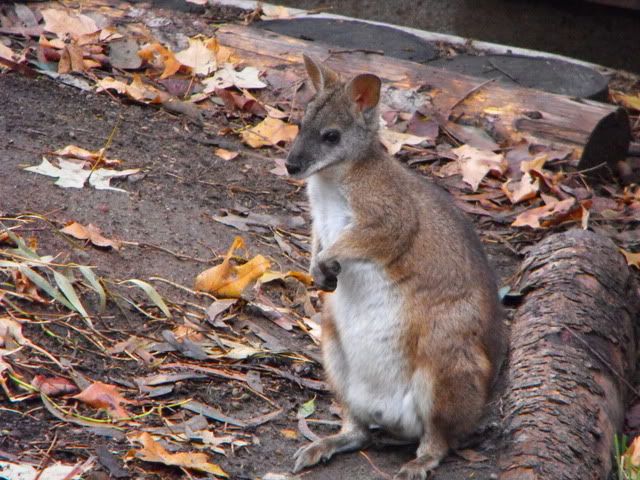
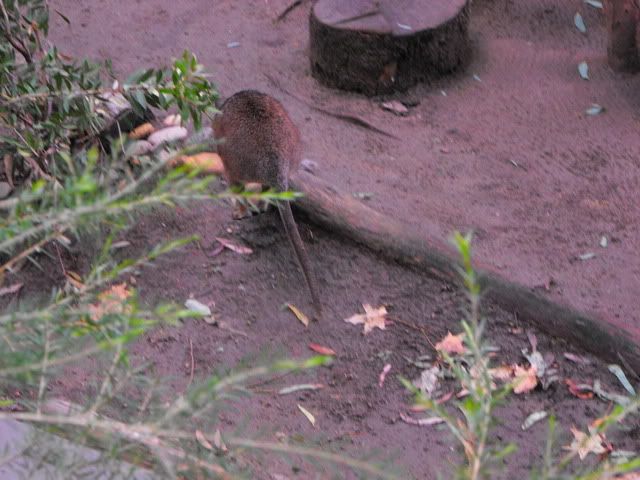
A wallaby in action!! Check out that hop!

I just want to snuggle those fuzzy ears. Yes, I know I'm weird. We've already established that.
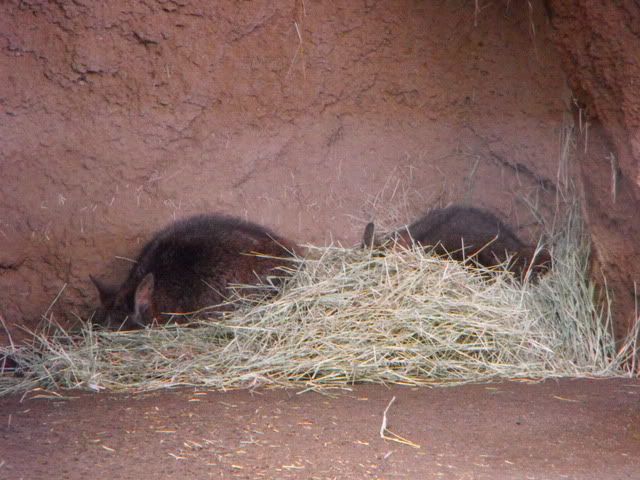
They look like bunnies here, all curled up in their hay. All together now, awwwwwwwwwwww.
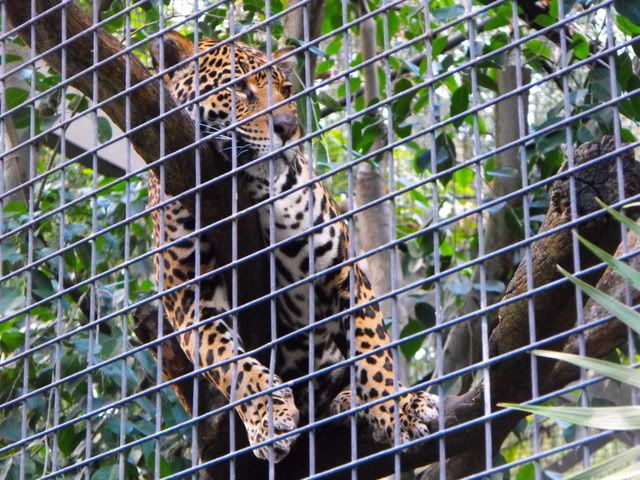
What's this? A very serious, regal, large kitty?
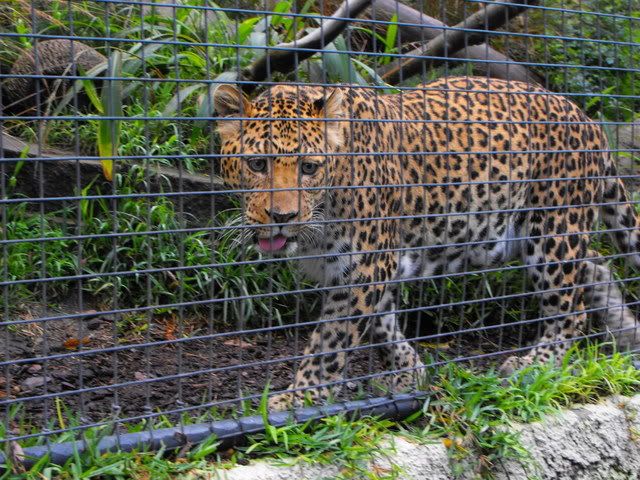
Nope.
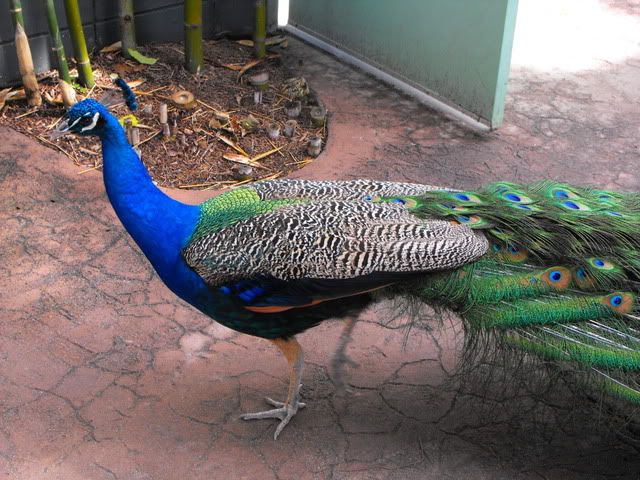
This peacock was being fed when we walked by. WF tried to get in close, and it threat-displayed him by opening up its plumage. He was too busy trying to get away from it again to take a pic (shame) but here's the next best one we got:
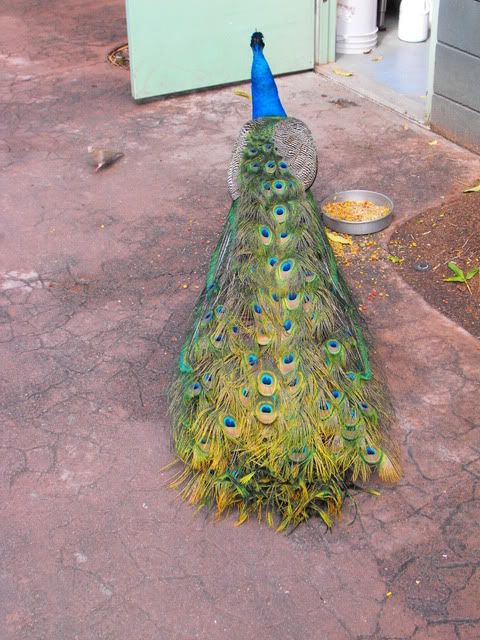
And then, a few hours later, we saw these creatures! The rare Sleeping Mimic Cats! Known for their tenacious commitment to sleeping in the same position at the same time! We managed to capture only two photos.
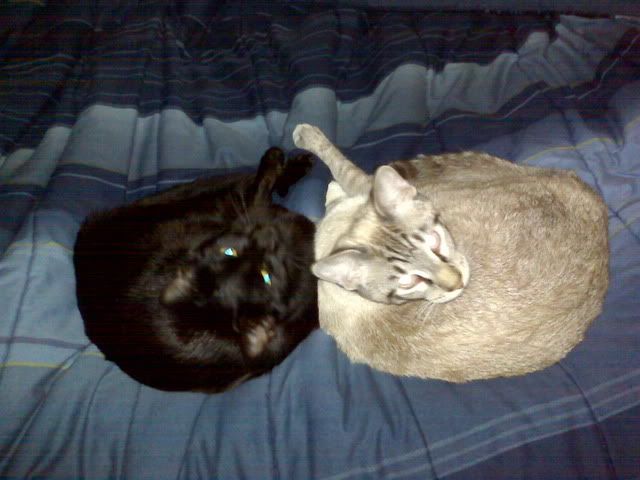
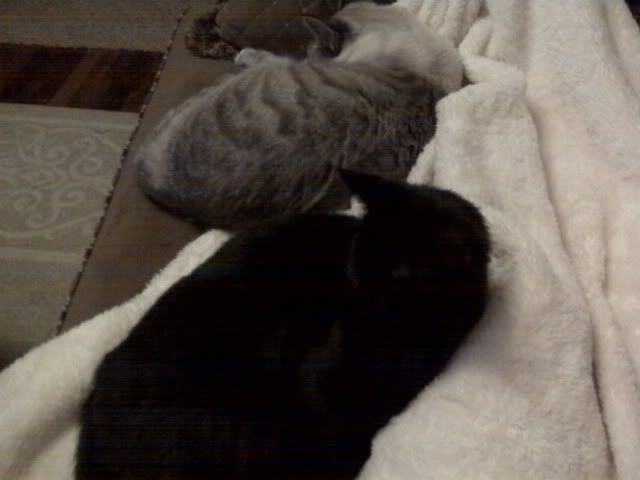
And that's our day at the zoo. All pictures by me or my future husband.
WALLABIES!!!!!
Okay, I'm done. For today.
WALLABIES!!!!
*Ahem.
I haven't done a wallaby post in a while and I keep meaning to post some of the ADORABLE pictures we got the last time we went-- all the way at the end of February. Yikes.
Anyway, here are some wallaby pics with a few other nice shots and memorable moments thrown in. Enjoy.
No, that's not a respectful suggestion. That's an order. Everyone needs to enjoy wallabies, otherwise, what do we live for?
*Ahem. Wow. I have wallaby fever bad... and on to cuteness!


A wallaby in action!! Check out that hop!

I just want to snuggle those fuzzy ears. Yes, I know I'm weird. We've already established that.

They look like bunnies here, all curled up in their hay. All together now, awwwwwwwwwwww.

What's this? A very serious, regal, large kitty?

Nope.

This peacock was being fed when we walked by. WF tried to get in close, and it threat-displayed him by opening up its plumage. He was too busy trying to get away from it again to take a pic (shame) but here's the next best one we got:

And then, a few hours later, we saw these creatures! The rare Sleeping Mimic Cats! Known for their tenacious commitment to sleeping in the same position at the same time! We managed to capture only two photos.


And that's our day at the zoo. All pictures by me or my future husband.
WALLABIES!!!!!
Okay, I'm done. For today.
Tuesday, April 6, 2010
Mad Libs Results Day #21
Sorry folks, I was home sick yesterday and my Mad Libs file was here at work. But moving forward, here we go!
Find the source article here.
Also, I goofed. First word should have been an adjective, not an adverb. Whoopsie. I've corrected all your adverbs into adjectives though, so hopefully it will still work and not detract from the funny.
From Matt:
But a more cutting explanation is that Ms. Crabapple possesses assets most of the aspiring stevedores lack. She has a legitimate black base, having represented a Shin-Yua-area Congressional district in a part of the state where her family is prominent. She has a network of "oranges", especially women, who are not going to abandon her. She has a commitment to working her rain off to keep the car, a fact that even her tall enemies swimmingly acknowledge.
From Stephanie Thornton:
But a more quick explanation is that Ms. Kruschev possesses assets most of the aspiring hydrogen bombs lack. She has a legitimate loud base, having represented a Minsk-area Congressional district in a part of the state where her family is prominent. She has a network of explosions, especially women, who are not going to abandon her. She has a commitment to working her turtle off to keep the bomb shelter, a fact that even her black enemies quietly acknowledge.
From Bane:
But a more ugly explanation is that Ms. Fooker possesses assets most of the aspiring ninjas lack. She has a legitimate specious base, having represented a Deluth-area Congressional district in a part of the state where her family is prominent. She has a network of "crimes", especially women, who are not going to abandon her. She has a commitment to working her trumpet off to keep the flag, a fact that even her scarred enemies scantily acknowledge.
From Donna:
But a more stark explanation is that Ms. Tremain possesses assets most of the aspiring butlers lack. She has a legitimate hot base, having represented a Podunk-area Congressional district in a part of the state where her family is prominent. She has a network of trains, especially women, who are not going to abandon her. She has a commitment to working her seat off to keep the bar, a fact that even her rare enemies creepily acknowledge.
From Dangerous With A Pen/ Lindsey:
But a more gloomy explanation is that Ms. Stout possesses assets most of the aspiring enemies lack. She has a legitimate slight base, having represented a Princeton-area Congressional district in a part of the state where her family is prominent. She has a network of "funds", especially women, who are not going to abandon her. She has a commitment to working her peacock off to keep the tophat, a fact that even her upbeat enemies stealthily acknowledge.
Good show, chaps! I'm particularly fond of "working her peacock off to keep the tophat"-- sounds just crazy enough to work. Also, I think I will begin using this phrase in my everyday life. No, I'm not sure what it means. Thank you to Lindsey. And a round of applause to Donna for trying out her first Mad Libs-- I like "Podunk-area Congressional district".
Find the source article here.
Also, I goofed. First word should have been an adjective, not an adverb. Whoopsie. I've corrected all your adverbs into adjectives though, so hopefully it will still work and not detract from the funny.
From Matt:
But a more cutting explanation is that Ms. Crabapple possesses assets most of the aspiring stevedores lack. She has a legitimate black base, having represented a Shin-Yua-area Congressional district in a part of the state where her family is prominent. She has a network of "oranges", especially women, who are not going to abandon her. She has a commitment to working her rain off to keep the car, a fact that even her tall enemies swimmingly acknowledge.
From Stephanie Thornton:
But a more quick explanation is that Ms. Kruschev possesses assets most of the aspiring hydrogen bombs lack. She has a legitimate loud base, having represented a Minsk-area Congressional district in a part of the state where her family is prominent. She has a network of explosions, especially women, who are not going to abandon her. She has a commitment to working her turtle off to keep the bomb shelter, a fact that even her black enemies quietly acknowledge.
From Bane:
But a more ugly explanation is that Ms. Fooker possesses assets most of the aspiring ninjas lack. She has a legitimate specious base, having represented a Deluth-area Congressional district in a part of the state where her family is prominent. She has a network of "crimes", especially women, who are not going to abandon her. She has a commitment to working her trumpet off to keep the flag, a fact that even her scarred enemies scantily acknowledge.
From Donna:
But a more stark explanation is that Ms. Tremain possesses assets most of the aspiring butlers lack. She has a legitimate hot base, having represented a Podunk-area Congressional district in a part of the state where her family is prominent. She has a network of trains, especially women, who are not going to abandon her. She has a commitment to working her seat off to keep the bar, a fact that even her rare enemies creepily acknowledge.
From Dangerous With A Pen/ Lindsey:
But a more gloomy explanation is that Ms. Stout possesses assets most of the aspiring enemies lack. She has a legitimate slight base, having represented a Princeton-area Congressional district in a part of the state where her family is prominent. She has a network of "funds", especially women, who are not going to abandon her. She has a commitment to working her peacock off to keep the tophat, a fact that even her upbeat enemies stealthily acknowledge.
Good show, chaps! I'm particularly fond of "working her peacock off to keep the tophat"-- sounds just crazy enough to work. Also, I think I will begin using this phrase in my everyday life. No, I'm not sure what it means. Thank you to Lindsey. And a round of applause to Donna for trying out her first Mad Libs-- I like "Podunk-area Congressional district".
Sunday, April 4, 2010
Earthquake
Most everything seems to be fine here. We weren't home for it, but our house appears to be undamaged and nothing even out of place.
We were at W.F.'s parent's house,and had just sat down to Easter dinner when it started. Everything rumbled and swayed for what felt like forever. There have been a few small aftershocks, but hopefully nothing bigger again in the coming days. It was centered about 112 miles southeast of us in MexiCali, and last I heard at a 7.2. My heart goes out to the people there-- knowing that the construction in the area could be pretty similar to that of Haiti and Chile, I can imagine that there are casualties and damage. I don't have much definitive news just yet, but I'm hoping it's not as bad as the other two recent disasters.
Just wanted to let any of you who were wondering know we're okay over here-- I haven't really heard of any building damage (in the San Diego area, at least), and I have friends and relatives all over the county.
We were at W.F.'s parent's house,and had just sat down to Easter dinner when it started. Everything rumbled and swayed for what felt like forever. There have been a few small aftershocks, but hopefully nothing bigger again in the coming days. It was centered about 112 miles southeast of us in MexiCali, and last I heard at a 7.2. My heart goes out to the people there-- knowing that the construction in the area could be pretty similar to that of Haiti and Chile, I can imagine that there are casualties and damage. I don't have much definitive news just yet, but I'm hoping it's not as bad as the other two recent disasters.
Just wanted to let any of you who were wondering know we're okay over here-- I haven't really heard of any building damage (in the San Diego area, at least), and I have friends and relatives all over the county.
Friday, April 2, 2010
I'm "using" these to "make a point" and Mad Libs Words Day
So Matt Delman of Free the Princess "fame" has "egged" me on to using "unnecessary quotes" today. Hope you're "happy", Matt.
But actually, that "leads" me into a topic. Punctuation. It's like the "stylistic" brush of writers. We "use" certain punctuation as a form of "personal expression" when we write. There can be both "intentional" and "unintentional" stylistic uses, and I tend to "think" that they are based on the way we use speech in our real lives.
Me for example, I "have" a tendency to overuse "semi-colons", for some "reason". I think this is because when I talk in "normal" conversation, I pause a lot. Semi-colons in my "writing" "represent" the same kinds of pausing and sentence structure I "use" when I'm speaking.
It's just the way my "thoughts" run. Of course there are the "grammatically correct" ways of using punctuation, but these "rules" can-- and often are-- "broken" by writers. (By the way, I also "tend" to use em-dashing a lot).
Anyway, "moving on", here are your Mad Libs "Words" for the day. Leave your answers in the "comments" by Sunday evening and I'll post the results "Monday".
Adverb
Last Name
Plural Noun
Adjective
Town or city, real or fictional
"Plural Noun"
Noun
Noun
Adjective
Adverb
What punctuation do you tend to "abuse"?
